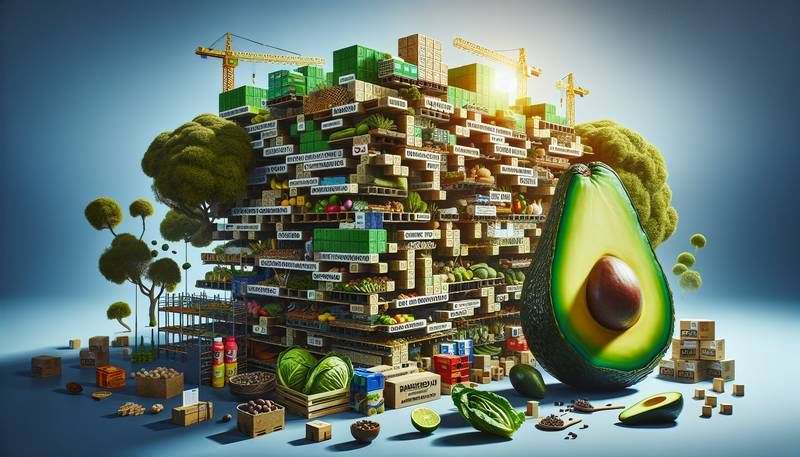Food Supply Chain Threats: Protecting Brand Reputation Amidst Global Challenges

Greeting the Food Supply ChainThere’s nothing quite like a perfectly ripe avocado or a crisp lettuce leaf to make you feel like you’re living your best life. But behind that delightful green facade lies a food supply chain that often resembles a high-stakes game of Jenga. Pull one wrong block, and suddenly you’re dealing with a global disaster of moldy bread and sad-looking tomatoes.Food supply chains operate like a well-oiled machine—or perhaps more accurately, a group of toddlers trying to assemble IKEA furniture. It’s intricate, complex, and filled with unexpected challenges. Factors such as climate change, geopolitical tensions, and, let’s face it, the occasional rogue pigeon can throw a wrench in the works. The consequences? They can be disastrous for food brands. Climate Change: Nature’s Dramatic OveractIf you’ve ever tried to predict the weather on a Monday morning, you know that reliability is not Mother Nature’s strong suit. Climate change is the ultimate drama queen of global challenges, flinging extreme weather conditions about with reckless abandon. Floods, droughts, and hailstorms are all part of her repertoire, and they have a direct impact on agricultural production.As crops fail or yields fall due to unpredictable conditions, the food supply chain takes a hit. This instability can lead to increased prices and decreased quality, which, by the way, is not the kind of surprise consumers want when they open their fridge. Brands risk losing their customers if they can't provide the fresh produce and high-quality goods that people expect.Geopolitical Issues: A Game of ChickenNow let’s dip our toes into the murky waters of geopolitics. Imagine trying to enjoy a picnic while a chicken fight breaks out nearby—that’s the level of distraction geopolitical unrest can cause in the food supply chain. Trade wars, sanctions, and political unrest can create a domino effect, leading to disruptions that might cause your favorite taco truck to run out of ingredients.Countries closing their borders to exports or imposing sudden tariffs can lead to shortages and rising costs. Brands need to navigate these perilous waters with grace, or they might find themselves facing outraged customers wondering why their guacamole is no longer green but rather a sad shade of beige.Quality Control: The Tightrope WalkEnsuring quality control in the food supply chain is akin to walking a tightrope while juggling flaming swords. One slip, and you could be facing a recall nightmare, complete with headlines that read, “Brand X’s Mysterious Green Slime.” Nobody wants to be that brand.Maintaining high standards for safety and quality is paramount. Regular inspections, rigorous testing, and maintaining good relationships with suppliers are essential. Anything less, and brands may find themselves in a PR disaster faster than you can say “bacteria.” Brand Reputation: Your Most Prized PossessionBrand reputation isn’t just the glittering crown atop your brand’s head; it’s the lifeline that keeps it afloat. In a world where social media reigns supreme, a single mishap can lead to an avalanche of bad reviews, Twitter rants, and viral memes that would make even the most optimistic marketer cringe.How do brands protect their reputation amid these global challenges? Transparency, accountability, and a good dose of humor can go a long way. When brands share their story—warts and all—their customers may be more likely to stick around. After all, if you can laugh about the time your lettuce supplier was caught trying to pass off romaine as iceberg, you’re already winning.Risk Management: The Crystal BallAsk any risk manager, and they’ll tell you: predicting the future is a tricky business. The food supply chain is full of uncertainties, and brands need to prepare for the unexpected. Enter risk management, the trusty crystal ball that helps them see potential threats on the horizon.Brands should regularly assess risks associated with their supply chain and develop contingency plans. Utilizing data analytics can help identify potential disruptions before they occur. It’s like having a cheat sheet for the exam of life—never a bad idea!Final Thoughts: Keeping the Fruits of Labor SweetAs the food supply chain faces a plethora of challenges, it’s imperative for brands to stay one step ahead. Navigating climate change, geopolitical issues, and quality control demands a mix of savvy strategies and a sprinkle of resilience. Brands that prioritize their reputation, invest in risk management, and maintain transparency will find themselves reaping the rewards, ensuring their customers enjoy not just delicious food, but a good story to go with it. After all, in the realm of food, you want your supply chain to be as fresh as that out-of-the-oven bread, not as stale as last week's leftovers!
|
|







